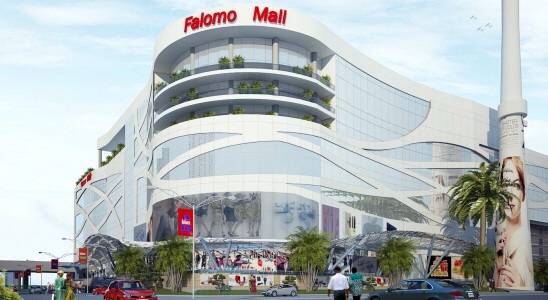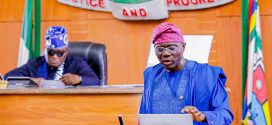…Walmart’s visit to Nigeria is suddenly looking like it was no coincidence.
The wolf cries in the night and chicken is found dead in the morning is a proverb commonly used by many. So when Ambode gives Walmart the “license to operate” in the state and then, two weeks later, cancels a concession agreement with a local company who is looking at the same retail business Walmart is interested in, only one phrase comes to people’s minds – VESTED INTEREST
The worldwide web has been inundated with the story of the cancellation of the concession granted by the Lagos State Government, under the last administration of Babatunde Fashola to Afriland Properties for the for the redevelopment of the Falomo Shopping Centre, Ikoyi.

This is happening just a few weeks after the new governor had rolled out the drums to welcome Walmart, the global retails giant, to open shops in the state, a development that has drawn severe condemnation from many corners, including this platform.
Considering the timing of this cancellation, many might be compelled to think that Governor Ambode may have taken this action to facilitate the entry of Walmart into the country and may eventually handover the shopping complex to the American giant.
However, in a statement signed by his Chief Press Secretary, Habib Aruna, the Governor was said to have premised the cancellation following the discovery that the concession was “grossly detrimental to the interests of the people of the state.”

“The concessionaire, Afriland Properties, paid only N50 million for a 50-year lease of the property belonging to the government. The State Government as custodian of the interests of Lagosians is committed to the restructuring of the Lagos State Development and Properties Corporation, LSDPC, (the agency that handled the transaction), to ensure it begins to provide positive capital returns to the State Government for the ultimate benefit of the people.
LSDPC has been adjudged to be a leakage, making lean returns to the state government and the governor had two months ago, relieved its former Managing Director, Biodun Oki, of his appointment, in a bid to, according to the statement, stem the tide of negative capital returns of the corporation.
Government agencies have really not been known to be accountable in all parts of the country. The culture of treating investments by governments as private concerns did not start today. Most people that have been handed the job of managing them have had the predictable attitude of displaying poor creativity in their management as businesses established to make profits and prosper the people.
On this score, Ambode could be said to have taken the right step.
But when it is looked at from the perspective of marketing government-private sector relations, suspicions arise, especially, as stated earlier, since Ambode had made it clear he was preparing to welcome competition in the nature of a Walmart, in the retail business.
Concessioning a huge outlet such as the Falomo Shopping Complex for N50million (and for a period of N50 years) comes across as very ridiculous if what the governor said was true. Land alone in that neighbourhood costs a whole lot more than that in real terms. Whoever bought that place did not just buy the land, but also bought the well-known brand, Falomo Shopping Complex along with it.
But as it has turned out, Afriland is even disputing this. In a statement it circulated, the company suggested that Governor Ambode and his government may not have told the publ;ic the whole truth about the deal and did even deem it necessary to contact the company and inform it of its decision (if it has taken it anyway) of voiding the concession agreement.

In the said statement, Afriland, through its Managing Director, Uzoamaka Oshogwe, denied claims that it got the popular shopping complex for N50 million and on a 50 year lease.
Claiming it has been reading the reports of the purported revocation of the concession agreement only in the media, Oshogwe said: “These unverified reports have implied that, the contract with the Lagos State Development and Property Corporation (LSDPC) was terminated on the grounds that the concession terms are grossly detrimental to Lagos State and its residents. The reports also claim that Afriland Properties Plc only made a payment of N50 million for a 50-year lease of the government-owned land.
Continuing she said that the N50 million allegedly said by the government to have been paid for the complex, on the contrary, represented what she called an “expression of interest” in the development project.

“Afriland Properties PLC and the Lagos State Development Property Corporation (LSDPC), acting on behalf of the Lagos State Government, established a Special Purpose Vehicle( SPV) which is jointly owned by the parties for the specific purpose of developing the Falomo project. Under the terms of the agreement, the SPV – Falomo Shopping Centre Development Company Ltd – was granted a concession to, amongst other things, develop, build, operate and maintain the Project on a Build, Operate and Transfer (BOT) basis.
“The LSPDC will receive a 35% interest in the SPV for its land contribution, and through this significant Equity Holding, will continue to receive significant ongoing value. Afriland is obliged to fund the entirety of the development costs which is projected to exceed N30 billion without recourse to the Nigerian taxpayer. The new facility will comprise a state-of-the-art shopping mall, office complex and generous parking facilities,” the statement read.
Oshogwe further explained that all value to be derived from the creation of the world-class commercial venture will be held in, and enjoyed by Lagos State and its residents. The development will ultimately revert to the state upon expiration of the lease.
“Apart from delivering an environment that befits the city and is consistent with the government’s goal of an aesthetically pleasing skyline, the Falomo site will be home to thriving businesses that will contribute significantly to the Internally Generated Revenue (IGR) of the state.”
Perhaps there may be other liability issues attached to the sale that we have not seen yet. Perhaps there were other considerations that informed the alleged decision of the government.

Whatever be the true situation, I think the transaction could have been handled differently for reasons stated below:
Over two years of investment should not be washed away by one executive order:
Afriland Properties have been on that site for more than two years. Demolition had taken place and the company had already invested hundreds of millions of naira in redeveloping the Complex to bring it to modern standards. This company, from my findings, is a Nigerian company owned by people doing business in Nigeria.
I would have felt renegotiating the transaction would have been a better option, if that was even necessary, especially since the company did not acquire the property illegally.
Like Walmart, like Okotie-Eboh’s shoe factory?
A British author wrote a very famous story about the Nigerian political elite of the 1960s. In this story, famous politician and then minister, Chief Festus Okotie-Eboh had sworn he was going to ban the importation of leather and shoes into the country as a move to save scarce foreign exchange. Very laudable, especially since the country had potential to produce hide & skin in very large quantities (we had been eating, still eating all of them in the form of kanda or ponmo).
But when he relaxed and was still talking to the writer, Chief Okotie Eboh, revealed to his guest that he planned to retire from politics and open a leather manufacturing company.
Having given the green light to a foreign company and then cancelling the concession given to a Nigerian company a few weeks later, people would be forgiven if they suspect Afriland was being stifled to pave the way for the new “government friends” to move in.
FIWON and the “think Nigeria” position
Following the meeting between Governor Ambode and a team from Walmart where an oral “license to operate” was granted the America retail giant, the Federation of Informal Workers of Nigeria (FIWON) had written an open letter to the governor and President Muhammadu Buhari on the need to discourage foreigners from taking over the Nigeria retail business sector.
FIWON had premised their claim that Walmart may not be the best choice in developing the country’s retail industry, not just on account of the well-reported narratives about the poor wage structure of the American giant but also on the implications of such business in the country in the area of capital flight, unemployment, etc.
If a Nigerian is ready and willing to provide an alternative to the Walmarts and Shoprites of this world, should they not have been encouraged? This is not an attempt to validate what looks like a deal that shortchanged the state government and its people. On the contrary, the state is encouraged to look at such transactions and find a means of redressing whatever the gaps may have been.
Such steps include renegotiating the deal in the light of whatever gaps were noticed and taking steps to protect the interest of the state without compromising the huge investments that have been made by the private sector partner, in this case, Afriland Properties.
Frustrating indigenous enterprise and aligning with foreigners to do the same thing?
Many people have held the view that governments in Nigeria would be mouthing local business development and capital growth while habouring a complex for foreign businesses whose motives never really go beyond profit taking no matter how nicely they are clothed. If the Lagos State Government had really revoked this concession agreement, did it thoroughly think of the far-reaching implications it would have on the interests of Nigerians rich and creative enough to do business with governments in Nigeria?
I say this because in Afriland’s press statement, it stated as follows: “As a significant investor in Nigeria and one which is committed to ensuring value creation within the country, we would underline the importance of creating a business environment that is based on transparency, contractual certainty and social partnership. At a time when Nigeria urgently needs to diversify its economy, the rumours we have identified do little to promote the National interest or create the business environment our country needs.”
This is very true.
Can’t we learn from the Local Content Act
Following years of undercutting Nigeria and Nigerians by giving jobs and projects that could have been done incountry and by indigenous manpower in the oil and gas industry, government eventually was able to push through the Nigerian Content Act that prescribes for a minimum percentage of oil and gas projects and activities to be executed in country and by Nigerians.
This Law is expected to save government billions of dollars and ensure a lot more Nigerians participate in the oil and gas business either as entrepreneurs or skilled employees.
What is wrong in encouraging indigenous capital from multiplying and spreading in Nigeria? Should governments not encourage this rather than find excuses on why they should not thrive? Most would reason along the line of Lagos State Government working with partners such as Afriland to grow and develop businesses in the state rather than take steps most suspect have been deliberately made to stifle business interests while encouraging foreign domination.
Walmart’s visit to Nigeria is suddenly looking like it was no coincidence.
Source: Brandish.com
 Hottestgistnaija.com
Hottestgistnaija.com





